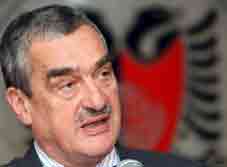EU warns Belarus not to recognize Abkhazia, South Ossetia
By Temuri Kiguradze
Wednesday, February 25

Speaking after a meeting in Brussels, Karel Schwarzenberg, the Czech Foreign Minister, stated that the decision on recognition of the regions is the sovereign right of the Parliament of Belarus but added that such a step would leave Minsk isolated. The Czech Republic now holds the EU's rotating Presidency.
"If they recognize South Ossetia and Abkhazia it would create a very, very difficult situation for Belarus because Belarus would be outside the European consensus," the Minister underlined on February 24. Schwarzenberg had attended the meeting dedicated to the Eastern Partnership initiative, which considers extending a special partnership programme to Armenia, Azerbaijan, Belarus, Georgia, Moldova and Ukraine, enabling these ex-USSR states to establish closer relations with the Union on such important issues as trade and border crossing procedures.
In April the EU will decide whether to extend a relaxation of political sanctions against Belarus and whether to invite the country to take part in a new initiative to strengthen ties with East European nations. Belarus has shown some signs of internal reform, although it is often described as the last dictatorship in Europe and retains close ties with Moscow.
The vote on Abkhazia and South Ossetia should be conducted in Belarus Parliament on April 2. Speaking in early February Russian Foreign Minister Sergey Lavrov stated that Moscow “expects” the recognition of Georgia’s separatist regions from “the partners of Russia” including Belarus, however he declined that there is any kind of pressure on these countries. “Of course we are interested in our partners taking this step and they know it very well. However we can’t and won’t put pressure on them, as we have stated several times,” said Lavrov in an interview with the Abkhazian Apsny magazine on February 1. The Russian Foreign Minister added that “despite the anti-Russian campaign launched by Saakashvili’s Western protectors,” Russia’s allies had already announced their support for Abkhazia and South Ossetia and participated in humanitarian aid projects in these regions.
“Georgia understands that Belarus is under great pressure from Russia, because the Belarus economy is completely dependent on Russian gas. If Abkhazia and South Ossetia are recognized by the Belarus Parliament this will be regarded by Georgia as an unfriendly step,” Georgian Deputy Foreign Minister Davit Jalagania has stated.
Political expert Shalva Pichkhadze considers that the chances of the EU breaking off relations with Belarus over the Georgian breakaway regions are quite small. “The changing of Belarus’ political course from pro-Russian to the pro-Western is so important for the EU that they will try to maintain relations with it for as long as possible. If Minsk recognizes Abkhazia and South Ossetia of course EU will take some action, maybe worsen relations for a while, however eventually they will still find a common language with the Lukashenko regime in order to drag the country out of Russia’s orbit,” said Pichkhadze, speaking to The Messenger.
Russia recognized the independence of the Georgian provinces of Abkhazia and South Ossetia on August 26 2008, after the Russian-Georgian war. Russian leader Dmitry Medvedev explained this step as the “only possible way” to ensure the security of those territories. Russia appealed to the international community to support its recognition but its actions were strongly condemned by the majority of countries and international organizations including the UN, EU and OSCE.
The only country which followed Russia’s example was Nicaragua. In November 2008, Georgia broke off diplomatic relations with this Central American country and Georgian President Mikheil Saakashvili called Nicaraguan leader Daniel Ortega a “madman.” Tbilisi has declared that the breakaway regions are currently “occupied” by the Russian Army.
